- Home
- Tony Hillerman
People of Darkness
People of Darkness Read online
Tony Hillerman
People of Darkness
Contents
Chapter 1
It was a job which required waiting for cultures to…
Chapter 2
The rain converted itself abruptly into a flurry of popcorn…
Chapter 3
By the time Chee had made his cautious way down…
Chapter 4
Jimmy Chee sat with his boot heels propped on the…
Chapter 5
“Some of it’s easy to remember,” Henry Becenti said. “Hard…
Chapter 6
The spike on his desk the next morning held three…
Chapter 7
The Pueblo woman answered the doorbell and showed Chee into…
Chapter 8
Colton Wolf was running a little behind schedule. He had…
Chapter 9
Colton left the trailer just as the ten o’clock news…
Chapter 10
Colton reached the University of New Mexico parking lot a…
Chapter 11
Jim Chee had rolled the two-hundred-dollar check from Ben Vines…
Chapter 12
It was after sundown when Chee drove past the Tribal…
Chapter 13
Malpais, translated literally from the Spanish, means “bad country.” In…
Chapter 14
Colton Wolf had left tracks. Two witnesses had seen him.
Chapter 15
The way Jimmy Chee was propped against the pillows, he…
Chapter 16
When Martin left, Chee spent the next ten minutes on…
Chapter 17
It was 3:11 A.M. when Chee looked at his watch.
Chapter 18
Colton Wolf had left the car parked in the darkness…
Chapter 19
Jim Chee had been in the bathroom, getting himself a…
Chapter 20
Even as he trotted down the stairs toward the laundry…
Chapter 21
Chee kept the control lever of the viewer pressed halfway…
Chapter 22
A day later, Chee had taken a fruitless shot in…
Chapter 23
“My brother?” Fannie Kinlicheenie’s expression was puzzled. “You want to…
Chapter 24
They jolted down the dirt track toward the graded road…
Chapter 25
The doctor’s name was Edith Vassa. The midmorning sun slanted…
Chapter 26
The red plastic bag was in a storage room on…
Chapter 27
The secretary from Dr. Huff’s office met them as they…
Chapter 28
At the cost of hours of driving from here to…
Chapter 29
Finally Colton Wolf was ready. He’d had both a CB…
Chapter 30
The Bisti trading post had burned years ago, with the…
Chapter 31
They built the fire in the crevasse between two of…
Chapter 32
Chee passed the word to Sheriff Sena via the radio…
Books by Tony Hillerman
Copyright
About the Publisher
1
It was a job which required waiting for cultures to grow, for toxins to develop, for antibodies to form, for reagents to react. And while she waited, the bacteriologist would roll her wheelchair to the windows and look down upon the world. The world below was the parking lot of the Cancer Research and Treatment Center, the neighbor of the bacteriologist’s Communicable Disease Laboratory on the University of New Mexico North Campus. It was a crowded lot, and a competitive one, and somewhere in the second year of watching it, the bacteriologist found herself familiar with its patterns. She knew when the meter maids made their rounds, and how long it usually took the tow truck to arrive, and what sort of violation provoked this ultimate punishment, and which vehicles tended to park illegally. She even knew of a romance which seemed to have flared between the female owner of a Dat-sun and the male owner of the blue Mercedes convertible that parked in the space reserved for one of the lofty administrators. Somewhere in that same second year she had started bringing her binoculars to the lab. She had finally left them there. They were in her hands now—focused upon a dirty green pickup truck which was nosing its way hesitatingly into a space guarded by a sign that read:
RESERVED FOR ASSOCIATE DIRECTOR
VIOLATORS WILL BE TOWED AT OWNERS
EXPENSE
The bacteriologist had learned long ago that cancer patients tended to be scofflaws. They were dying and they knew it. In the face of that, other considerations became less important. But habits of civilized behavior still generally prevailed. It was rare to see such open defiance as the pickup was now demonstrating.
The defiant one was male, an Indian. Through the binoculars he didn’t look defiant. He looked stolid and sick. He climbed laboriously from the cab. The bacteriologist noticed a suitcase on the passenger’s seat and felt a sudden mild thrill of admiration. He was checking himself in, abandoning his truck forever to the mercies of the law. The nose thumbed at fate. But the Indian left the suitcase behind.
He was a large man, with the heavy torso and slender hips the bacteriologist had learned to identify with Navajos. He wore jeans and—despite the August heat—a denim jacket. He walked slowly toward the patients’ entrance—a sick man’s walk. He’ll check himself in, the bacteriologist thought, and then he’ll come back and get the suitcase, and move the truck.
Now there was another vehicle showing equally blatant illegality. It was a Chevrolet, silver-gray and new, which rolled past the green pickup and came to rest in the space reserved for the CRTC director. The driver’s door opened and a slender man emerged, dressed in white, a straw hat pushed back on his head. The man stood for a moment, apparently looking at the pickup truck. Then he walked around his car and opened the door on the passenger’s side. He leaned in, apparently working on something on the front seat. Finally he lifted out a grocery sack with its top folded down. He placed it on the bed of the pickup, among the boards and boxes against the cab. That done, he looked around him, studying the parking lot, the sidewalks, staring finally directly toward the bacteriologist. He was very blond, she saw. Almost an albino. Within a minute he was back in the gray Chevy, driving slowly away.
It was almost noon when the bacteriologist determined that the life form that had reproduced itself in her petri dish was not a food-poisoning salmonella but harmless nonpathogenic Escherichia coli. She made the required notes, completed the report, and pushed her chair back to the window. A tow truck had arrived. The bacteriologist focused her binoculars. The driver’s helper was completing the attachment of the towing bar to the rear of the green pickup. He waved his left hand and squatted beside the pickup wheel, watching something. The sound of the tow truck winch was lost to distance and insulated glass. But the bacteriologist could see the rear of the pickup begin to rise.
Abruptly, all vision was lost in a dazzle of light. The sound came a second later—a cannon-shot boom. The glass on the bacteriologist’s window was pressed inward to its tolerance and just beyond; it cracked, then flexed violently outward, where its shards joined those of a hundred other windows raining down on the empty sidewalks below.
2
The rain converted itself abruptly into a flurry of popcorn snow. It rattled off Jim Chee’s uniform hat, bounced down the collar of his uniform jacket, and made him shiver. It was the third day of November by the First National Bank of Grants calendar back on Chee’s desk, and the very beginning of the Season When the Thunder Sleeps by the less rigid traditional calendar of the Dinee. By either calendar it was too ear
ly for this sort of weather—even at this mile-and-a-half altitude on the slope of Mount Taylor. Howard Morgan had predicted possible snow flurries on his Channel 7 weathercast, but Chee hadn’t believed it. He’d left his winter coat back at the police station.
He glanced at his vehicle—a white Chevrolet with the seal of the Navajo Nation and the legend NAVAJO TRIBAL POLICE blazoned on its door. He could retire to the car and turn on the heater. He could seek shelter at the entryway of the residence of Benjamin J. Vines, and perhaps ring the bell a few more times in the hope of attracting someone. The bell made an odd singing sound which he could hear echoing pleasantly through the heavy door. While it had attracted no response at all, Chee was tempted to ring it again just to hear it. The third alternative was to turn up the collar of his jacket to ward off the sleet and continue satisfying his curiosity about this house. It had been designed, so he’d heard, by Frank Lloyd Wright, and was reputed to be the most expensive home in New Mexico. Chee’s curiosity about it, as about all things in the white man’s world, was intense. It was all the more intense at the moment because he might very soon enter that strange world. By December 10, less than five weeks away, he had to decide whether he would accept an appointment to the FBI, and a place in the world of singing doorbells.
He pulled his jacket collar around his neck, and folded down his hat brim, and continued his inspection. Chee was standing beside a semidetached triple garage. Like the house itself, it was built of native granite, linked to the structure by a low, curving wall of the same material. Just behind the wall, in a grassy plot no more than fifteen feet long, two small markers of black marble held Chee’s attention. Gravestones. He leaned over the wall. The name chiseled into the one just to the right of where Chee stood was DILLON CHARLEY. Under it, the legend read:
He Didn’t Remember When He Was Born
Died December 11, 1953
A Good Indian
Chee grinned. Was the sardonic double meaning intended? Was Vines, or whoever had ordered this legend carved, familiar with General Sheridan’s dictum that the only good Indian was a dead Indian?
The stone to Chee’s left read:
MRS. BENJAMIN J. VINES (ALICE)
Born April 13, 1909
Died June 4, 1949
A Faithful Woman
Faithful to B. J. Vines? It seemed an odd thing to put on a tombstone, but then everything about the white man’s burial customs seemed odd to Chee. The Navajos lacked this sentimentality about corpses. Death robbed the body of its value. Even its identity was lost with the departing chindi. What the ghost left behind was something to be disposed of with a minimum risk of contamination to the living. The names of the dead were left unspoken, certainly not carved in stone.
Chee glanced again at the Charley tombstone. The name tugged at memory. There were no Charleys in Chee’s clan—the Slow Talking Dinee—and none among the other clans that occupied the Rough Rock country of his family. But here on the east margin of the reservation—among the Salt Dinee, and the Many Goats Dinee, and the Mud Clan, and the Standing Rock Clan—the name seemed fairly common. And somebody named Charley had done something recently which he should be able to remember.
“Does it seem an unusual place for a graveyard?”
The voice came from behind him. A woman, perhaps in her mid fifties, with a thin, handsome, unsmiling face. She was wearing a coat of some expensive fur over jeans. A navy knit cap covered her ears. “It's one of B.J's little eccentricities, burying people by the garage. Are you Sergeant Chee?”
“Jim Chee,” Chee said. The woman was looking at him, frowning critically, making no offer to shake his hand.
“You're younger than I expected,” she said. “They told me you were an authority on your religion. Could that be right?”
“I'm learning to be a yataalii,” Chee said. He used the Navajo word because no English word really expressed it. The anthropologists called them shamans, and most people around the reservation called them singers, or medicine men, and none of these expressions really fit the role he would play for his people if he ever finished learning to play it. “Are you Mrs. Vines?” he asked.
“Of course,” the woman said. “Rosemary Vines.” She glanced at the tombstone. “The second Mrs. Vines. But let's get out of this sleet.”
The house had puzzled Chee. Its front wall was a sweeping, virtually windowless curve, suggesting a natural formation of stone. But inside the massive entry doors and through the entry foyer the puzzle solved itself. The front was actually the back. The ceiling rose in a soaring curve toward a great wall of glass. Beyond the wall, the mountain slope fell away. Now the view was obscured by clouds and gusts of sleet, but on the usual day Chee knew the glass overlooked immense space—across the Laguna and Acoma Indian reservations to the south and east, southward across the forty-mile sea of cooled lava called the malpais toward the Zuni Mountains, and eastward across the Cañoncito Reservation to the great blue hump of the Sandia Mountains behind Albuquerque. The room was almost as spectacular as the view. A fireplace dominated the native-stone interior wall to Chee’s left, with the pelt of a polar bear on the carpet by the hearth. On the wall to his right, a hundred glassy eyes stared from trophy heads. Chee stared back: water buffalo, impala, wildebeest, ibex, oryx, elk, mule deer, and a dozen species he couldn’t name.
“It takes some getting used to,” Mrs. Vines said. “But at least he keeps all the fierce-looking ones in his trophy room. These are the ones that couldn’t bite back.”
“I had heard he was a famous hunter,” Chee said. “Didn’t he win the Weatherby Trophy?”
“Twice,” Rosemary Vines said. “In 1962 and 1971. Those were bad years for anything with fang, fur, or feathers.” She draped the mink over the back of a sofa. Under it she wore a man’s plaid shirt. She was a trim woman, one who took care of her body. But there was a tension about her. It showed in her face, in the way she held herself, in the taut muscles along her narrow jaw. Her hands twisted together at her belt line.
“I’ll have a drink,” Mrs. Vines said. “Join me?”
“No, thank you,” Chee said.
“Coffee?”
“If it’s no trouble.”
Mrs. Vines spoke into the grillwork beside the fireplace. “Maria.” The grille buzzed in response.
“Bring a Scotch and some coffee.”
She turned back to Chee. “You’re an experienced investigator. That’s right, isn’t it?” she asked. “And you’re stationed at Crownpoint and you know everything about the Navajo religion.”
“I was transferred to Crownpoint this year,” Chee said, “and I know something about the customs of my people.” This was not the time to tell this arrogant white woman that the Navajos had no religion in the white man’s meaning of the term (in fact, had no word in their language for religion). First he would find out what she wanted with him.
“Sit down,” Rosemary Vines said. She gestured toward a huge blue sofa and seated herself in a chair of stainless-steel tubing and polished leather.
“Do you also understand witchcraft?” She perched at the edge of the chair, smiling, tense, her hands twisting now in her lap. “That business about Navajo Wolves, or skinwalkers, or whatever you call them. Do you know all about that?”
“Something,” Chee said.
“I’ll want to hire you, then,” Rosemary Vines said. “You have some accrued annual leave coming….” An elderly woman—a Pueblo Indian, but Chee wasn’t sure which Pueblo—came in with a tray. Mrs. Vines took her glass—from its color, more Scotch than water—and Chee accepted his coffee. The Indian woman examined him from the corner of her eye with shy curiosity. “You have thirty days’ leave time,” Mrs. Vines continued. “That should be more than enough.”
For what? Chee thought. But he didn’t say it. His mother had taught him one learns through the ear and not the tongue.
“We had a burglary here,” Mrs. Vines said. “Someone broke in, they got into B.J.’s quarters and stole a box of his kee
psakes. I want to hire you to get it back. B.J.’s at a hospital in Houston. I want it back before he gets home. I’ll pay you five hundred dollars now and twenty-five hundred dollars when you return the box. If you don’t get it back, you don’t get the twenty-five hundred dollars. That’s fair enough.”
“You can have the sheriff do it for you for free,” Chee said. “What does the sheriff say about it?”
“Gordo Sena,” Mrs. Vines said. “B.J. has no use for Sena. Nor do I. B.J. wouldn’t want him involved in any way. Besides, what good would it do? They’d send out some ignorant deputy. He’d ask a lot of questions and look around and then he’d go away and that would be the end of it.” She sipped Scotch. “There’s absolutely nothing for the police to go on.”
“I’m police,” Chee said.
“It will be simple enough for you,” Mrs. Vines said. “The People of Darkness stole the box. You find them and get it back.”
Chee felt swallowed by the sofa, engulfed in velvety royal-blue comfort. He considered what Mrs. Vines had said, seeking some sense in it. Her eyes were studying him. One of her hands held the glass. The ice moved in the trembling liquid. The other hand fidgeted on the denim of her jean leg. Sleet rattled and scratched at the plate-glass window. Beyond the glass, night was coming.
“The People of Darkness,” Chee said.
“Yes,” said Rosemary Vines. “It must have been them. Did I tell you nothing was taken except the box? Look around you.” She gestured at the room. “They didn’t take the silver, or the paintings, or anything else. Just the box. They came to get it. And they took it.”

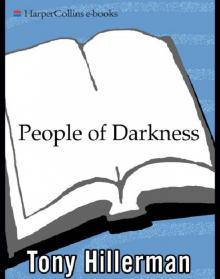 People of Darkness
People of Darkness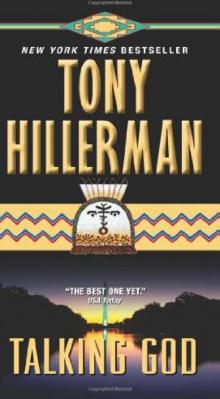 Talking God jlajc-9
Talking God jlajc-9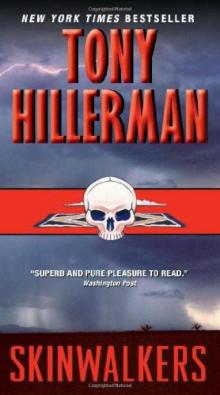 Skinwalkers jlajc-7
Skinwalkers jlajc-7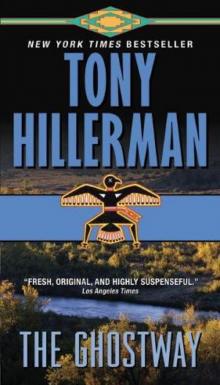 The Ghostway jlajc-6
The Ghostway jlajc-6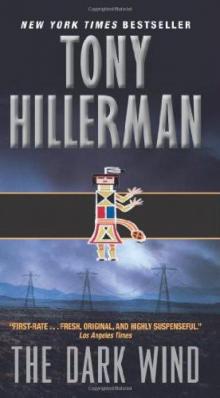 The Dark Wind jlajc-5
The Dark Wind jlajc-5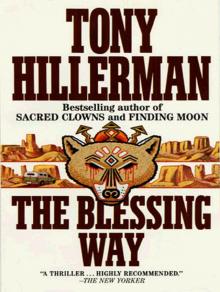 The Blessing Way
The Blessing Way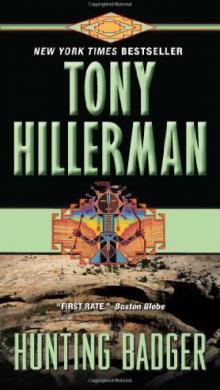 Hunting Badger jlajc-14
Hunting Badger jlajc-14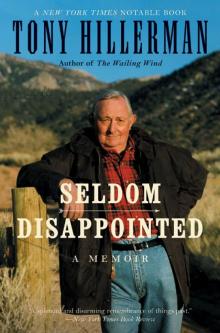 Seldom Disappointed: A Memoir
Seldom Disappointed: A Memoir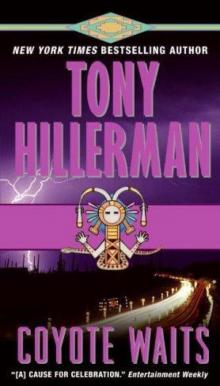 Coyote Waits jlajc-10
Coyote Waits jlajc-10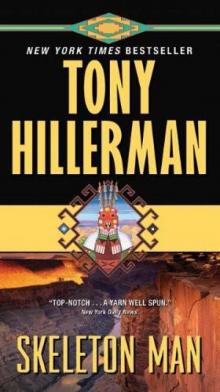 Skeleton Man jlajc-17
Skeleton Man jlajc-17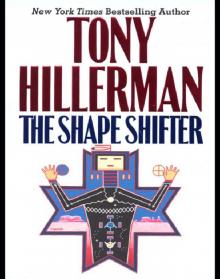 The Shape Shifter
The Shape Shifter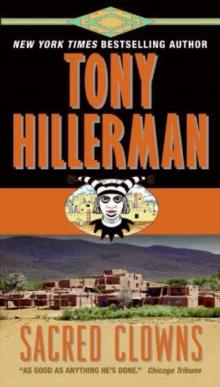 Sacred Clowns jlajc-11
Sacred Clowns jlajc-11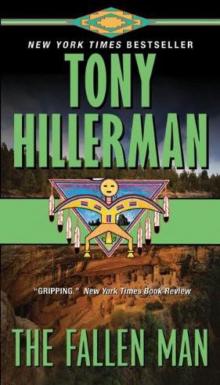 The Fallen Man jlajc-12
The Fallen Man jlajc-12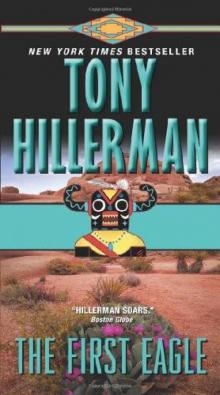 The First Eagle jlajc-13
The First Eagle jlajc-13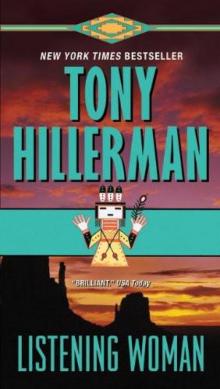 Listening Woman jlajc-3
Listening Woman jlajc-3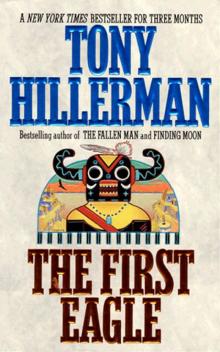 The First Eagle
The First Eagle Skeleton Man
Skeleton Man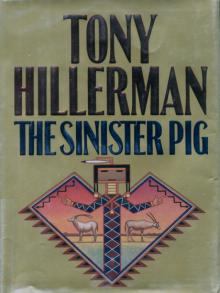 The Sinister Pig jlajc-16
The Sinister Pig jlajc-16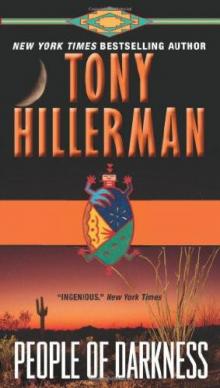 People of Darkness jlajc-4
People of Darkness jlajc-4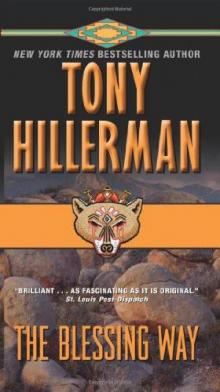 The Blessing Way jlajc-1
The Blessing Way jlajc-1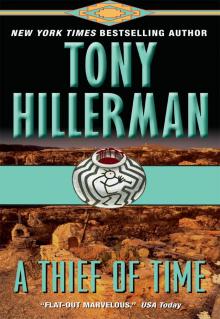 A Thief of Time
A Thief of Time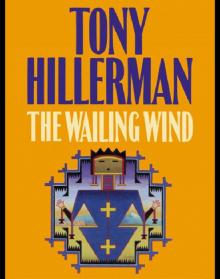 The Wailing Wind
The Wailing Wind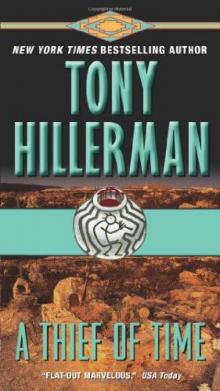 A Thief of Time jlajc-8
A Thief of Time jlajc-8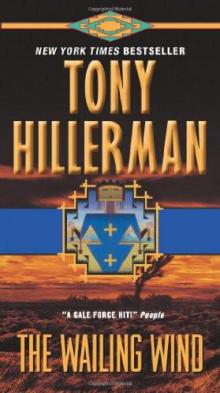 The Wailing Wind jlajc-15
The Wailing Wind jlajc-15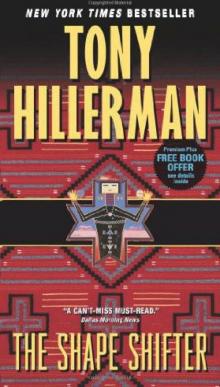 The Shape Shifter jlajc-18
The Shape Shifter jlajc-18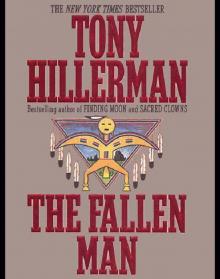 The Fallen Man
The Fallen Man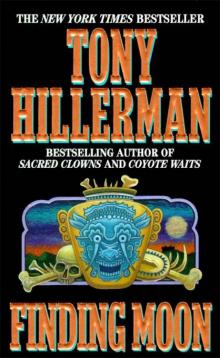 Finding Moon
Finding Moon